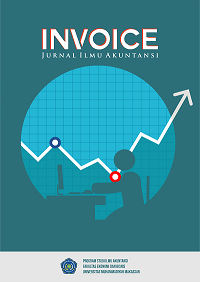Government Internal Control System, Role and Comparison of the Committee of Sponsoring Organization (COSO) Revised Internal Control Framework
DOI: https://doi.org/10.26618/inv.v5i1.10525
Abstract
This study investigates the role of the Government Internal Control System and its points of difference with the revised version of the COSO internal control framework. The Government's Internal Control System is regulated in Government Regulation No. 60 of 2008 concerning the Government's Internal Control System. The Government's Internal Control System aims to provide adequate assurance for the achievement of effectiveness and efficiency in achieving the objectives of implementing State government, reliability of financial reporting, safeguarding State assets, and compliance with laws and regulations. Government Regulation No. 60 of 2008 is an adaptation of the internal control recommended by The Committee of Sponsoring Organizations (COSO) in 1992. In its development, COSO has updated the integrated framework of internal control in 2013. Seventeen principles of internal control were explicitly introduced that should be considered by the government to formulate new regulations related to the Government's Internal Control System. This study highlights the important role of internal control in the management of organizations both in the private sector and in governmentReferences
Aziz MAA, Raman HA, Alam MM, & Said J. (2015). Enhancement of the Accountability of Public Sector through . Procedia Economics and Finance .
COSO (Committee of Sponsoring Organizations of the Treadway Commission. (2013). Internal Control - Integrated Framework Executive Summary.
Kawedar W., Sodikin , Handayani RR S, Purwanto A. (2019). Good Governance, System Internal Control , and Performance Finance Organization Sector public . Matrix : Journal Management , Strategy Business And Entrepreneurship
Hendiarto RS, Rohmat RD, Yuniar IN, Cahyani SA, Sumarni S., & Sugih AV (2022). The Effect Of Internal Control On Performance (Case Study on MSMEs assisted by the West Java Chamber of Commerce and Industry in Bandung City). Central Asia and the Caucasus.
Marsuni, N. S., & Rismawati, R. (2018). INCOME AND COST ANALYSIS OF BUSINESS ACTIVITIES DEVELOPMENT AT THE BUSINESS DEVELOPMENT CENTER (P2B) STATE ISLAMIC UNIVERSITY OF MAKASSAR. Jurnal Ekonomi Balance, 14(1), 129-136.
Marsuni, N. S., & Yusuf, M. (2022). Concept of Financial Management in Islamic Perspective. INVOICE: JURNAL ILMU AKUNTANSI, 4(2), 346-352.
Marsuni, N. S., Said, D., & Indrijawati, A. (2022). Triple Button Line Implementation Through Corporate Social Responsibilty Program at PT. Semen Tonasa. Economos: Jurnal Ekonomi dan Bisnis, 5(2), 107-113.
Marsuni, N. S., Rasulong, I., & Adzim, F. (2022). Factors Affecting the Implementation of Good Government Governance (GGG) and Its Implications for Performance Accountability. Jurnal Ekonomi Balance, 18(1), 29-36.
Medina DA (2021). Analysis Application System Internal Control (SPI) in the Central Echelon I Unit Ministry of Religion . Shades .
Moeller RR (2014). Executive's Guide to COSO Internal Controls Understanding and Implementing the New Framework. John Wiley & Sons.
Nurhayati . (2015). Revealing and Building the COSO Concept and Khalifatullah Fill Ard Philosophy to Prevent and Detect the Occurrence of Fraud Through Forensic Accounting. Procedia Economics and Finance.
Regulation Government Republic of Indonesia Number 60 of 2008 concerning System Government Internal Control
Pitaloka H., Widayanti H., Savitri ASN, Mutohar , Kabib N. (2020). Application System Government Internal Control (SPIP) In Perspective of ''COSO'' in the village Kalikurmo Subdistrict Bringin Semarang Regency . Intellect : Journal Economics, Social & Humanities
Yuniarti R., Arroisi N., Arifta SB, Saudi MH (2022). The Effect Of Government Internal Control System On Fraud Prevention (Case Study On Family Hope Program Operator Tasikmalaya ). Central Asia and the Caucasus.
Downloads
Published
Issue
Section
License
Authors who publish with Invoice: Jurnal Ilmu Akuntansi agree to the following terms:
-
Copyright Ownership
The copyright of all articles published in this journal remains with the author(s). However, the authors grant Invoice: Jurnal Ilmu Akuntansi the right of first publication with the work simultaneously licensed under a Creative Commons Attribution 4.0 International License (CC BY 4.0). This license allows others to share, copy, redistribute, adapt, and build upon the work for any purpose, even commercially, as long as proper credit is given to the original author(s) and the source. -
Licensing and Access
Invoice: Jurnal Ilmu Akuntansi provides immediate open access to its content on the principle that making research freely available to the public supports a greater global exchange of knowledge. All published materials are available freely without subscription or payment and can be accessed, downloaded, and reused by any user provided that appropriate attribution is given. -
Permission for Reuse
For uses not covered by the CC BY 4.0 license, such as commercial reprints, translations, or any form of adaptation without clear attribution, users must obtain written permission from the editorial team. Requests for such permissions can be directed to the editorial office at: [invoice@unismuh.ac.id]. -
Plagiarism and Originality
Authors are responsible for the originality of their submissions. All articles are screened for plagiarism using appropriate tools before acceptance. Manuscripts found to contain unoriginal content or infringing materials will be rejected or retracted as per journal policy.















